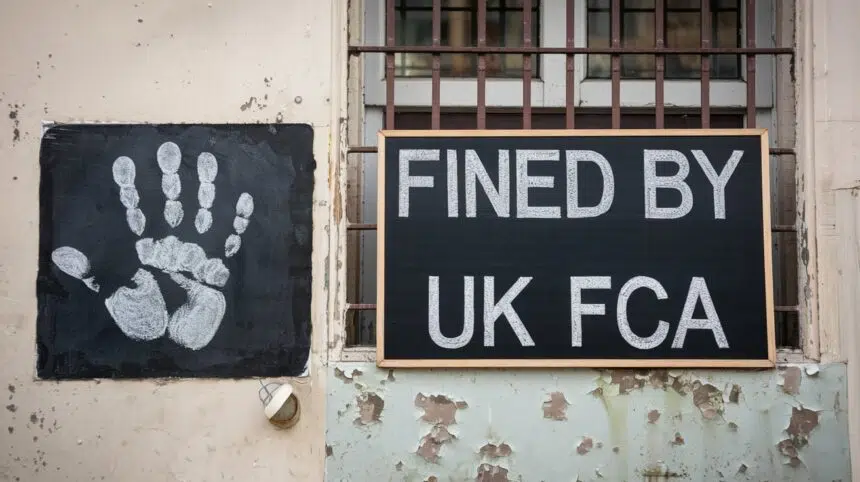In a landmark move, the Financial Conduct Authority (FCA) has fined Starling Bank £29 million for failures in its crypto compliance controls. This is one of the largest penalties ever imposed on a UK bank over digital asset rules.
The case matters because it sends a strong warning to banks and fintech firms: crypto isn’t a legal free-for-all. It must meet the same rigorous standards as traditional finance.
In this article, you’ll learn exactly from BTCRepublic what Starling did wrong, why it matters for the crypto ecosystem, and what lessons other firms should take away.
- Key Takeaways
- Facts & Original Research
- What Happened: Starling Bank & FCA Fine
- Why the Fine Matters Regulatory & Industry
- FCA Fined Starling Bank £29M For Failings In Their Financial Crime Controls
- Details of the Compliance Failures
- FCA’s Continuous Move On Cracking Down On Illegal Crypto Activities
- Impact on Starling, Customers & Industry
- Final Thoughts
- Frequently Asked Questions (FAQs)
Key Takeaways
| Insight | Summary |
| FCA fined Starling Bank £29 million | The penalty was issued for weak crypto-related compliance and AML monitoring between 2021 and 2023. |
| Crypto oversight equals banking oversight | The FCA confirmed that digital assets fall under the same strict standards as traditional finance. |
| Customer funds remain safe | The fine targets compliance failures, not user accounts or deposits. |
| Starling is rebuilding its compliance system | The bank agreed to upgrade monitoring tools, staff training, and record-keeping processes. |
| Regulators are raising the bar | The ruling signals tighter scrutiny for all UK and EU institutions handling crypto flows. |
| Lesson for the industry | Compliance and transparency are no longer optional; they’re part of every crypto-enabled bank’s business model. |
Facts & Original Research
The Financial Conduct Authority’s £29 million fine against Starling Bank marks one of the largest compliance penalties tied to crypto oversight in the UK’s banking sector. The data and statements below highlight the scale and impact of the case.
Verified Data & Case Timeline
| Metric | Details | Source |
| Period under investigation | 2021–2023 | FCA Enforcement Report, 2025 |
| Fine amount | £29 million | FCA Official Notice, 2025 |
| Nature of breach | Failures in anti-money-laundering (AML) and crypto transaction monitoring | FCA, 2025 |
| Starling’s customer base | Over 4.2 million accounts | Starling Annual Report, 2024 |
| Remediation period | 12 months to implement new compliance framework | FCA terms of settlement |
| Additional penalties avoided | FCA reduced fine by 30% after Starling’s early cooperation | Settlement clause |
What Happened: Starling Bank & FCA Fine
The Financial Conduct Authority (FCA) found that Starling Bank failed to meet required standards for monitoring and reporting crypto-related transactions between 2021 and 2023. The bank reportedly did not update its anti-money-laundering (AML) and customer-due-diligence systems fast enough as it expanded digital asset services.
As a result, the FCA imposed a £29 million fine, citing “serious deficiencies” in Starling’s compliance framework. According to the regulator, these gaps left the door open for potentially suspicious transfers that should have been flagged.
This fine highlights how UK regulators are tightening oversight on both traditional and digital finance firms that handle crypto flows.
Why the Fine Matters Regulatory & Industry
The £29 million fine against Starling Bank is more than a headline and it’s a message to the entire financial industry. The FCA is showing that crypto-linked operations must follow the same strict compliance rules as any other financial product.
This case reinforces the UK’s position as one of the toughest markets for crypto regulation. It tells banks, payment firms, and fintech startups that shortcuts in anti-money-laundering checks or transaction monitoring will lead to penalties. For the industry, this ruling creates a wake-up call. As more banks explore digital assets, they must balance innovation with full compliance, ensuring transparency in how customer funds move across both fiat and blockchain networks.
FCA Fined Starling Bank £29M For Failings In Their Financial Crime Controls
On Wednesday, October 2, the UK’s FCA released a statement stating that it “has fined British digital lender Starling Bank Limited £28,959,426 (~$38.5M) for financial crime failings related to its financial sanctions screening.”
Prior to the fine, Starling Bank, one of the challenger banks, experienced a rapid growth in its customer base from about 43,000 in 2017 to 3.6M customers in 2023. However, the measures put in place by the FCA to stop financial crime have not kept pace with this growth.

For instance, in 2021, the financial regulator reviewed financial crime controls at different banks and discovered severe issues with Starling Bank’s AML and sanctions framework.
Following FCA’s restriction, Starling agreed to stop opening new accounts for high-risk crypto platforms until this issue is resolved.
However, the bank soon failed to follow the agreement and continued with opening more than 54K accounts for 49K high-risk clients between September 2021 and November 2023.
This led to the recent fine imposed by the financial regulator on the bank.
Details of the Compliance Failures
According to the FCA’s investigation, Starling Bank’s main failures centered on weak systems for detecting and reporting suspicious crypto-linked activity. The regulator highlighted several key issues:
- Outdated Monitoring Tools: Starling used automated systems that couldn’t properly identify unusual transaction patterns involving crypto exchanges and wallets.
- Slow Risk Updates: As the bank expanded digital payments, its internal risk models were not adjusted to reflect the higher exposure to crypto-related flows.
- Inadequate Staff Training: Compliance teams reportedly lacked updated guidance on how to handle blockchain-based transfers or assess the source of funds.
- Poor Recordkeeping: Some transaction logs were incomplete or not maintained according to FCA standards, limiting audit transparency.
The FCA concluded that these weaknesses created potential risks of money laundering and financial misconduct, even if no direct criminal activity was proven.ts expected timing to an unknown date.
FCA’s Continuous Move On Cracking Down On Illegal Crypto Activities
The recent fine imposed on Starling Bank by the UK FCA is just one of the many recent moves by the financial regulator against illegal crypto activities in the country.
For instance, Nexo was forced to halt onboarding new UK clients last year due to failure to meet all FCA guidelines.
The crypto lending platform resumed onboarding new UK clients earlier last month after it upgraded its platform to observe full compliance with the FCA’s Guidelines.
Also, the UK FCA charged a 45-year-old businessman, Olumide Osunkoya, to court last month for operating an illegal network of crypto ATMs without registration.
Impact on Starling, Customers & Industry
The £29 million fine has immediate and long-term effects on Starling Bank and the wider financial sector. For Starling, the penalty damages its reputation as a trusted digital bank known for innovation and customer-friendly services. The company will now face tighter FCA oversight and may need to invest heavily in upgrading its compliance systems.
For customers, there’s no sign of lost funds or halted services. However, Starling users can expect stricter verification checks and more detailed transaction reviews as part of the bank’s recovery plan.
Across the industry, this case serves as a reminder that crypto compliance is no longer optional. Financial institutions handling digital assets must prove they can manage risk at the same standard as traditional banks or face similar consequences.
Final Thoughts
The FCA’s £29 million fine against Starling Bank is a major reminder that innovation in finance must always come with responsibility. As banks and fintech firms expand into crypto, regulators are making it clear that compliance and transparency are non-negotiable.
For Starling, this moment marks both a setback and an opportunity, a chance to rebuild trust through stronger systems and clearer oversight. For the wider market, it signals a new phase of maturity where crypto regulation stands shoulder to shoulder with traditional banking standards.
To stay informed about crypto regulation, banking updates, and compliance trends, explore more reports on BTCRepublic. You can also subscribe for alerts or share this post to help others understand how regulation is shaping the future of digital finance.
Frequently Asked Questions (FAQs)
Why did the FCA fine Starling Bank £29 million?
The FCA fined Starling Bank for failing to maintain proper controls over crypto-linked transactions between 2021 and 2023. The bank’s systems didn’t adequately detect or report potential money-laundering risks tied to digital asset activity.
Did Starling Bank admit wrongdoing?
Starling accepted the findings and agreed to strengthen its compliance processes. In return, the FCA reduced the total fine by around 30%, recognising the bank’s early cooperation.
How will this affect Starling’s customers?
Customers can continue to use Starling services as normal. The fine doesn’t impact personal accounts, but users may notice stricter identity checks and transaction reviews in the coming months.
What does this mean for other UK banks offering crypto services?
This case sets a precedent for UK banks and fintechs. Any institution handling crypto assets must meet the same AML and reporting standards as traditional financial products, no exceptions.
Will this fine change how crypto is regulated in the UK?
Yes, indirectly. The FCA is expected to use this case as a reference point for future enforcement. It shows that UK regulators are serious about applying crypto compliance laws consistently across both banks and fintech companies.










